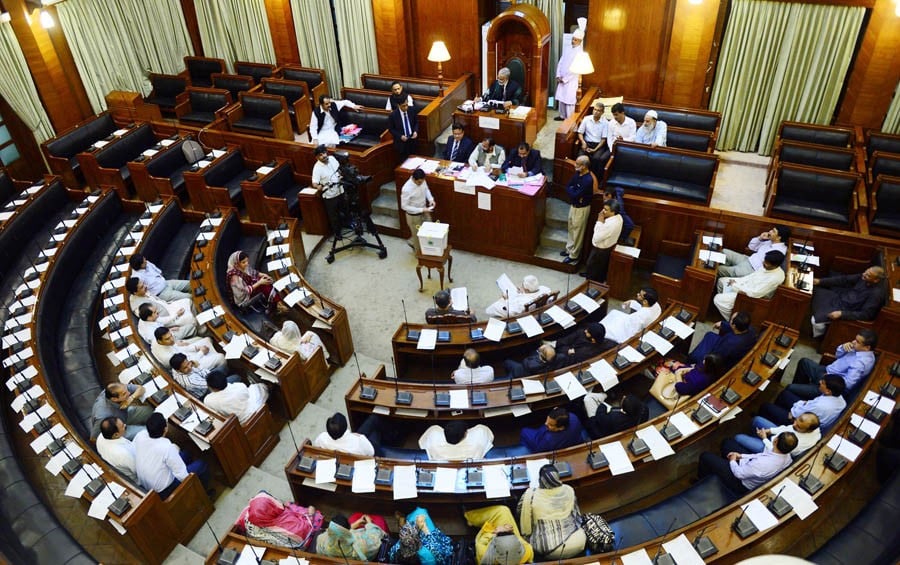
The decision of the PPP lawmakers to withdraw the forced conversion bill has disappointed the civil society activists

In the recent past, the civil society and rights activists have admired the Pakistan People’s Party (PPP), and particularly its young chairperson Bilawal Bhutto-Zardari, for supporting the Sindh Assembly in passing progressive legislations such as the Hindu Marriage Act, the Women’s Protection Act and the Child Marriage Act. They were also appreciated for attending festivals of other faiths.
Late November, they praised the Sindh Assembly’s lawmakers for unanimously passing the Sindh Criminal Law (Protection of Minorities) Bill, making forced conversions punishable with a life sentence and forbidding minors from changing their religion in a bid to protect minorities.
Nand Kumar Golkani, a legislator of the Pakistan Muslim League-Functional (PML-F), who belongs to the Hindu community, proposed the bill in the assembly a year ago. The bill was passed on the basis of a report of the Sindh Assembly’s Standing Committee on Minority Affairs, which had reviewed the bill. The bill recommends a five-year jail term for perpetrators, whereas a three-year sentence for facilitators of forceful religious conversion.
Non-Muslim communities, especially Hindus, welcomed the legislation as a "ray of hope". Krishan Sharma, head of the Rights of Expression, Assembly, Association and Thought (REAT) Network, says that religious minorities have been targeted through forced marriages to forced conversion [to Islam] and most of the affected are juveniles, especially girls. "The bill aimed at preventing and halting the years-long occurrence of forced religious conversions. It provided a sense of security to non-Muslim communities, especially Hindus."
But when the bill was waiting for the governor’s signature for making it a law, the PPP leadership could not withstand the pressure from the religious parties that vehemently oppose the bill. The Islamic parties from all schools of thought organised protests and all-parties conferences against the bill -- as it disallows conversion to Islam of those under the age of 18, even if by own free will.
"The bill contradicts Islamic principles and violates the Constitution of Pakistan," says Qari Muhammad Usman, the Sindh deputy head of the Jamiat-e-Ulema-e-Islam-Fazl. "Islam does not allow forced conversions, but there should be no restrictions on people converting to Islam by their own free will."
The law enforcement agencies have created panic among the lawmakers who were involved in drafting and consultation of the bill by issuing security alerts that warn of attacks by banned militant outfits. An alert issued by the Special Branch advised extra security for Kumar and Nisar Ahmed Khuhro, Sindh’s senior minister.
However, on Jan 6, late Governor Sindh Justice (retd) Saeed-uz-Zaman Siddiqui refused to ratify the bill, and asked Sindh Assembly secretariat to reconsider or amend the bill. Siddiqui passed away on January 11.
The PPP leaders and non-Muslim rights activists privy to the development believe that Bilawal asked lawmakers to not bow to the pressure of religious parties. But after the return of Asif Ali Zardari, the party’s co-chairperson, the PPP’s priorities changed. On December 16, Khuhro declared in a policy statement of the party that the Sindh government had decided to review and amend the bill.
"Just to appease the heads of key religious parties, the JUI-F chief Maulana Fazlur Rehman and the Jamaat-e-Islami chief Sirajul Haq, Zardari directed the Sindh chief minister to advise the governor to not approve the bill," says a lawmaker, requesting not to be named. "He needs their [religious parties] support in future politics."
Interestingly, the Muttahida Qaumi Movement (MQM) Pakistan, another liberal political party that supported the bill in November, had also sent a request to the Sindh governor to not approve the bill -- because the lawmakers had not got sufficient time to review the bill.
The civil society activists and non-Muslim rights groups are now seriously concerned about the bill. Afiya Shehrbano Zia, a Karachi-based social researcher, says the Sindh government has delivered nothing by way of basic material rights such as water, security, transport, education and health services. "But the one thing it could be relied on was to demonstrate some liberal symbolic support, and laws that aligned with the constitutional rights of vulnerable people."
At this turning point of a post-militancy Pakistan, it is shameful for the Sindh government to retreat on age 18 as the age of consent for conversion of religion, especially when they made it a minimum requirement for marriage, she said. "This is betrayal against the non-Muslims. But more than allowing themselves to be blackmailed by the non-elected Islamist trouble-making lobbies it is worse to see the silence among the liberal classes and intelligentsia on this critical reneging to the rearguard who will become emboldened at every legislation."
The National Assembly in early October had adopted a resolution for taking immediate steps to prevent forced conversions. However, non-Muslim rights activists do not see it would now be easy to present such bills. Terming the bill merely a point-scoring tactic, they believe the PPP has surrendered this milestone legislation, and is feeling under pressure from religious parties, which neither have representation in the Sindh assembly nor support among the people.
Sharma says the PPP deceived the non-Muslim communities of Sindh, and "its retreat will embolden the people to freely commit this crime [forced conversions] under the guise of religion without fearing prosecution."